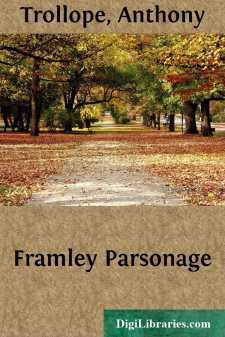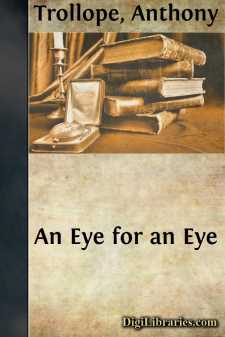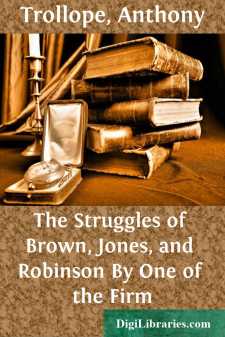Categories
- Antiques & Collectibles 13
- Architecture 36
- Art 48
- Bibles 22
- Biography & Autobiography 813
- Body, Mind & Spirit 141
- Business & Economics 28
- Children's Books 12
- Children's Fiction 9
- Computers 4
- Cooking 94
- Crafts & Hobbies 4
- Drama 346
- Education 46
- Family & Relationships 57
- Fiction 11826
- Games 19
- Gardening 17
- Health & Fitness 34
- History 1377
- House & Home 1
- Humor 147
- Juvenile Fiction 1873
- Juvenile Nonfiction 202
- Language Arts & Disciplines 88
- Law 16
- Literary Collections 686
- Literary Criticism 179
- Mathematics 13
- Medical 41
- Music 40
- Nature 179
- Non-Classifiable 1768
- Performing Arts 7
- Periodicals 1453
- Philosophy 64
- Photography 2
- Poetry 896
- Political Science 203
- Psychology 42
- Reference 154
- Religion 513
- Science 126
- Self-Help 83
- Social Science 81
- Sports & Recreation 34
- Study Aids 3
- Technology & Engineering 59
- Transportation 23
- Travel 463
- True Crime 29
Framley Parsonage
by: Anthony Trollope
Description:
Excerpt
"Omnes Omnia Bona Dicere"
When young Mark Robarts was leaving college, his father might well declare that all men began to say all good things to him, and to extol his fortune in that he had a son blessed with so excellent a disposition. This father was a physician living at Exeter. He was a gentleman possessed of no private means, but enjoying a lucrative practice, which had enabled him to maintain and educate a family with all the advantages which money can give in this country. Mark was his eldest son and second child; and the first page or two of this narrative must be consumed in giving a catalogue of the good things which chance and conduct together had heaped upon this young man's head.
His first step forward in life had arisen from his having been sent, while still very young, as a private pupil to the house of a clergyman, who was an old friend and intimate friend of his father's. This clergyman had one other, and only one other, pupil—the young Lord Lufton; and between the two boys, there had sprung up a close alliance. While they were both so placed, Lady Lufton had visited her son, and then invited young Robarts to pass his next holidays at Framley Court. This visit was made; and it ended in Mark going back to Exeter with a letter full of praise from the widowed peeress. She had been delighted, she said, in having such a companion for her son, and expressed a hope that the boys might remain together during the course of their education. Dr. Robarts was a man who thought much of the breath of peers and peeresses, and was by no means inclined to throw away any advantage which might arise to his child from such a friendship. When, therefore, the young lord was sent to Harrow, Mark Robarts went there also.
That the lord and his friend often quarrelled, and occasionally fought,—the fact even that for one period of three months they never spoke to each other—by no means interfered with the doctor's hopes. Mark again and again stayed a fortnight at Framley Court, and Lady Lufton always wrote about him in the highest terms. And then the lads went together to Oxford, and here Mark's good fortune followed him, consisting rather in the highly respectable manner in which he lived, than in any wonderful career of collegiate success. His family was proud of him, and the doctor was always ready to talk of him to his patients; not because he was a prize-man, and had gotten medals and scholarships, but on account of the excellence of his general conduct. He lived with the best set—he incurred no debts—he was fond of society, but able to avoid low society—liked his glass of wine, but was never known to be drunk; and above all things, was one of the most popular men in the University. Then came the question of a profession for this young Hyperion, and on this subject Dr. Robarts was invited himself to go over to Framley Court to discuss the matter with Lady Lufton. Dr. Robarts returned with a very strong conception that the Church was the profession best suited to his son....












